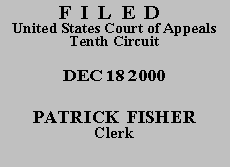

| UNITED STATES OF AMERICA,
Plaintiff-Appellee, v. CEDRIC DONNELL BROOKS, also known as Scout, also known as Adonis Bailey, Defendant-Appellant. |
|
On April 22, 1999, defendant filed his "Motion requesting that the defendant's respond to government procedure default be heard in the interest of justice," in which he sought to establish cause for his failure to raise the claims on direct appeal by asserting the ineffective assistance of his appellate counsel. As part of the motion, defendant sought to amend his § 2255 motion to add claims of ineffective assistance of trial counsel and ineffective assistance of appellate counsel. Because this motion was filed more than ten days after the district court's entry of final judgment, and because the motion challenged the basis of the district court's denial of relief and sought to amend the § 2255 petition, we will construe the post-judgment motion as one pursuant to Rule 60(b) of the Federal Rules of Civil Procedure. See Weitz v. Lovelace Health Sys., Inc., 214 F.3d 1175, 1178 (10th Cir. 2000) (noting that we generally construe motions to alter or amend or to reconsider that are filed more than ten days after judgment as a motion for relief under Rule 60(b)); Seymour v. Thornton, 79 F.3d 980, 987 (10th Cir. 1996) (holding that a party cannot amend a complaint after judgment has entered unless he first sets the judgment aside pursuant to Rule 59(e) or Rule 60(b)).
We have held that a Rule 60(b) post-judgment motion filed in a § 2255 proceeding cannot be used to circumvent the restrictions on filing second or successive petitions contained in the Antiterrorism and Effective Death Penalty Act of 1996 (AEDPA). Lopez v. Douglas, 141 F.3d 974, 975 (10th Cir. 1998) (per curiam). Accordingly, we have held that a Rule 60(b) post-judgment motion should be treated as "a second habeas petition under [AEDPA]." Id. Under AEDPA, defendant was required to obtain prior authorization from this court before filing a second § 2255 motion in district court. 28 U.S.C. § 2244(b), § 2255. This he failed to do. Therefore, the district court did not have jurisdiction to rule on defendant's second motion, and we must vacate the district court's order. Lopez, 141 F.3d at 975-76.
We will, however, construe defendant's notice of appeal and his appellate briefs as an implied application for leave to file a second § 2255 motion in district court. Id. at 976. Based upon our review of defendant's implied application, we conclude that he has not made the showing necessary for authorization to file a second § 2255 motion. In particular, defendant has not established the existence of either "newly discovered evidence that, if proven and viewed in light of the evidence as a whole, would be sufficient to establish by clear and convincing evidence that no reasonable factfinder would have found the movant guilty of the offense," or "a new rule of constitutional law, made retroactive to cases on collateral review by the Supreme Court, that was previously unavailable." 28 U.S.C. § 2255.
Accordingly, the district court's order of October 25, 1999 disposing of defendant's unauthorized second petition is VACATED, and defendant's implied application for leave to file a second § 2255 motion is DENIED. Defendant's "Motion Requesting 20 Days to Respond to the Government['s] Response to the Appell[ant's] Request for Certificate of Appeal" is GRANTED.
The mandate shall issue forthwith.
Entered for the Court
Circuit Judge
*. This order and judgment is not binding precedent, except under the doctrines of law of the case, res judicata, and collateral estoppel. The court generally disfavors the citation of orders and judgments; nevertheless, an order and judgment may be cited under the terms and conditions of 10th Cir. R. 36.3.
1. After examining the briefs and appellate record, this panel has determined unanimously that oral argument would not materially assist the determination of this appeal. See Fed. R. App. P. 34(a)(2); 10th Cir. R. 34.1(G). The case is therefore ordered submitted without oral argument.
2. The court issued two orders on March 30, 1999. The first order was ten pages long and contained the court's analysis of defendant's § 2255 motion and its reasons for denying him relief. The second order simply recited that the matter was before the court on defendant's motion pursuant to 28 U.S.C. § 2255 and then stated: "IT IS ORDERED that defendant's Motion Pursuant to 28 U.S.C. § 2255 to Vacate, Set Aside, or Correct Sentence by a Person in Federal Custody should be and is DENIED." Dist. Ct. R., File #2, Doc. 107. This second order, which did not contain any discussion of the court's reasoning or any legal analysis, and which was entered on the docket on April 2, 1999, met the requirements of Fed. R. Civ. P. 58 for entry of final judgment on defendant's § 2255 motion. See Clough v. Rush, 959 F.2d 182, 185 (10th Cir. 1992) ("Generally, orders containing neither a discussion of the court's reasoning nor any dispositive legal analysis can act as final judgments if they are intended as the court's final directive and are properly entered on the docket.").